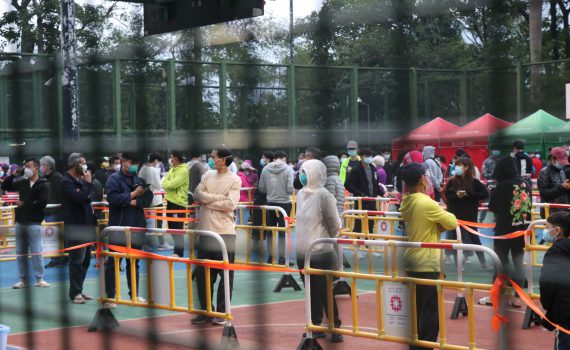By: Karmen LiEdited by: Jayde Cheung、Jenny Lam
Covid lockdown in Kwai Chung leaves residents in the lurch
- 2022-01-25
- Society
- The Young Reporter
- By: Karmen LiEdited by: Jayde Cheung、Jenny Lam
- 2022-01-25
Cancellation of Chinese New Year fairs leave farmers at a loss
- 2022-01-19
- Society
- The Young Reporter
- By: Malick GaiEdited by: Nicholas Shu
- 2022-01-19
Flower farmers and florists are left with thousands of unsold plants after the government cancelled all Lunar New Year fairs last Friday because of the spread of the Covid-19 Omicron variant. It’s the second year in a row that the annual flower markets are scrapped because of the pandemic. The fairs are some of the biggest events in the run up to Chinese New Year in Hong Kong. Flower markets are usually held in public parks such as Victoria Park in Causeway Bay and in Mong Kok. “The flower businesses usually experience a seasonal boom during festive occasions, when particularly auspicious flowers and plants, such as orchids and tangerine trees are sold,” said Samuel Ng, owner of Green House Nursery, a garden centre in Sai Kung. "When Chinese New Year approaches, some businesses would order at least 50 tangerine trees, but not for the past two years. These will have to be thrown out now," Ng said. His plants are imported from Guangzhou in mainland China. But bringing the plants to Hong Kong, he said, is increasingly difficult because they have to be disinfected and transferred between delivery trucks multiple times. Customers are often concerned whether the plants would wilt, and that puts pressure on the vendors to make sure their goods look fresh. Tung, who only wanted to give his family name, works in another flower shop in Sai Kung. He sources flowers from a wholesaler who purchases goods from Japan, mainland China, South America, Africa and Europe. These supply chains have been affected by transport delays and travel restrictions, resulting in the goods having to be refrigerated for weeks or even thrown away. "I haven't had a day off for 21 months. My wife and I are working 11 hours everyday to make up for the financial loss. …
Hong Kong to kill thousands of hamsters after COVID-19 outbreak
- 2022-01-19
- Society
- The Young Reporter
- By: Lokman Yuen、KOO Chi Tung 顧知桐Edited by: Tracy Leung、Malick Gai
- 2022-01-19
Hong Kong authorities will cull some 2,000 small rodents after hamsters in a pet shop tested preliminary positive for the Delta variant of COVID-19, the first to be discovered in a natural environment. Director of Agriculture, Fisheries and Conservation Leung Siu-fai announced in a press conference on Tuesday that pet shops selling hamsters were required to temporarily suspend their businesses and handover the rodents to the department for euthanasia after testing, regardless of the result. He also “strongly advised” pet owners who had bought a hamster in Hong Kong from Dec. 22 to turn them over. The announcement was made amid concerns over animal to human transmission, after 11 hamsters at Little Boss pet shop in Causeway Bay, tested preliminary positive for the virus. Environmental samples obtained from its Tai Po warehouse, which housed the imported hamsters from the Netherlands, also tested positive. “Although there was no evidence internationally to prove animals can spread COVID-19 to humans, but for the sake of prudence, we will implement preventive measures on every possible route of transmission,” Secretary for Food and Health Sophia Chan Siu-chee said. The virus was detected after a 23-year-old pet shop worker and a 67-year-old woman who visited the venue on Jan. 8 were infected. University of Hong Kong microbiologist and government advisor Yuen Kwok-yung told the reporters in the evening that it was essential to make such a decision and praised the judgment as “decisive and wise.” “I use this species in the laboratory for experiments every day, which are very sensitive towards the virus and are easily infected,” he said. He also said the hamsters will spread out a lot of viruses in the first 10 days, which means a long time for transmission. Yeung Lin-hing, who owns one of the 34 affected pet stores, said he …



